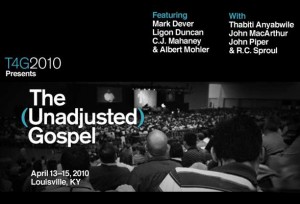 Yesterday, I posted some initial reflections on John Piper’s message at this year’s Together for the Gospel. Today, I’d like to comment on some of the other aspects of the event.
Yesterday, I posted some initial reflections on John Piper’s message at this year’s Together for the Gospel. Today, I’d like to comment on some of the other aspects of the event.
The Worship
I don’t go to many conferences. I am very selective, choosing two or maybe three a year. Together for the Gospel provided me with the opportunity to connect with a number of friends – some old and some new. But more than the friends, the sermons, and the books… I enjoyed the singing.
The sound of 7000 men singing the great hymns of the faith reminded me of Promise Keepers in the 1990’s. But T4G is even better because the songs are so rich in theological truth. At times, I was so moved by the lyrics of these hymns that I could not keep singing without breaking down in tears. Amazing love, how can it be?
Ligon Duncan on the Patristics
Duncan carefully showed how the Patristics taught the gospel. I was impressed that Duncan quoted from the Fathers in a way that did not force their theology into Reformational categories. He demonstrated both the importance of reading the Fathers within their context and the need to keep Scripture as our ultimate authority.
One question crossed my mind during his talk. Duncan made the case that when the Fathers are polemical – that is, engaging against heresy – they almost always get it right theologically. But when they are writing about non-disputed topics, their thought gets muddled.
If I were a Dan Brown kind of skeptic, I might reply: Could it be that we think the Fathers were right in their polemics precisely because they won the battle and we are the long-down-the-road recipients of the “orthodoxy” they achieved by winning the argument? I’m not arguing that this is the case. But I can imagine that someone skeptical of the Fathers’ rightness in polemical matters might ask this kind of question. I don’t know if Dr. Duncan reads this blog, but I would love to hear how he would respond to this kind of skeptic.
John MacArthur on Sleep
I enjoyed much of MacArthur’s sermon from Mark on the theology of sleep. It is indeed a privilege to be entrusted with sowing the seed and then resting in God while he brings about growth and life.
One statement from MacArthur elicited a number of conversations with other T4G attendees. (I was surprised that the panel didn’t discuss it.) MacArthur told us to never ever appeal to the emotions or will when calling people to repentance. We should appeal only to the intellect. His reasoning was that if we appeal to the emotions, we will get an emotional response.
I can’t imagine Spurgeon agreeing with that kind of statement. Even Edwards (who MacArthur appealed to in defense of his position) wouldn’t hold to a strict version of that idea either. In fact, I’m not sure that MacArthur himself practices “no emotional appeals.” Of course, we don’t want to manipulate the emotions and wind up with mere emotionalism as a response. But neither are we calling people to mere intellectual assent to the gospel.
Thabiti Anyabwile on Culture
Thabiti Anyabwile’s message on culture has already provoked some good conversation. At first glance, it appeared that Thabiti was denouncing all attempts to “engage the culture,” saying that this enterprise leads to liberalism and a watered-down gospel. But I am not sure this was his intention. Much of his message rightly emphasized the importance of the church as a counter-culture (a culture-creating institution by virtue of its being) for the sake of the gospel and for the world.
Some T4G attendees are openly asking if Thabiti’s message (as well as remarks from some of the other speakers) was an implicit critique of the emphasis of The Gospel Coalition, the missional movement, and some of the other camps within the Reformed Resurgence that recommend the cultural study and cultural adaptation for the proclamation of gospel truth. I don’t think this was Thabiti’s purpose.
The truth is… there are some segments of evangelicalism in which people are more culturally-aware than biblically literate. When you’ve got a pastor who can name off the main characters of 5 or 6 popular television shows but can’t find Haggai in the Bible, then you’re probably in a camp that has gone a bit too far in “engaging the culture,” to the point where gospel fidelity is in danger of being lost.
But there is another segment of evangelicalism that sees faithfulness in terms of cultural withdrawal and isolation. Biblical fidelity means cultural resistance and separation from people who choose different methodologies than we do. This camp may eventually be in danger of isolating themselves from the very people they are called to reach, or the other Christians that they should be in fellowship with.
And that leads me to one final point. We need to hear warnings from both sides on this issue. There is always a danger in seeking to extend the gospel to a culture. Syncretism and compromise are always lurking in the shadows. But there is also danger in cultural withdrawal and isolationism.
Satan loves to see Christians who are so much like the world that they lose their saltiness. He also loves to see Christians who stay in the saltshaker to preserve their purity and thus never make an impact on lostness.
We are not called to be “together for the gospel” for the gospel’s sake. The gospel has a power all its own. We are together for the gospel for the sake of this fallen world, in order to carry this message to those around us who need to hear its truth.


















